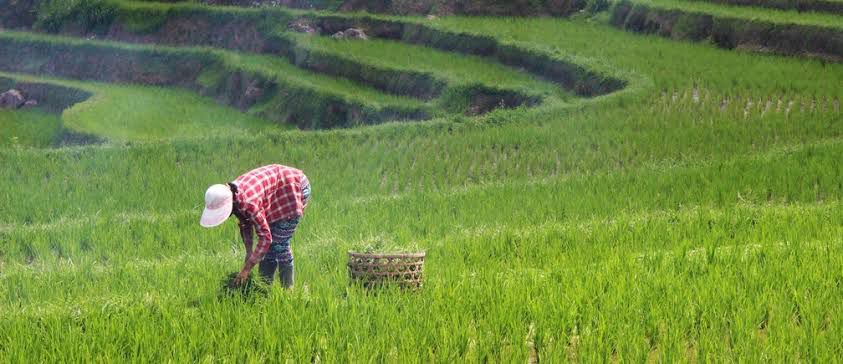Instagram loves a green girl. You know the type—earthy vibes, compost chic, yoga on reclaimed wood decks, and maybe a selfie next to a tree she “just planted”. She’s the face of a growing aesthetic that packages environmentalism as spiritual self-care. It’s soothing. But it’s not resistance. It’s not ecofeminism.
Meanwhile, somewhere in Punjab, a woman is saving seeds from genetically engineered crops. Her daughter is sick from pesticide exposure. Their land is drying up. No selfies, no campaigns. Just survival.
Ecofeminism isn’t a lifestyle brand. It’s a fight waged on the intersecting frontlines of gender, class, colonisation, and climate collapse. But thanks to elite NGOs and green capitalism that only care about pushing superficial campaigns and hashtags like #SaveThePlanet and #GoGreen, it’s being co-opted into something sterile—detached from soil, sweat, and power. This is an intervention.
I. Ecofeminism Was Never Soft
Ecofeminism emerged not as a feel-good ideology but as critique and resistance. In Ecofeminism (1993), Maria Mies and Vandana Shiva argued that the capitalist exploitation of nature mirrors the patriarchal exploitation of women’s bodies. Nature and women are both rendered as resources—plundered, privatised, and made invisible.
But this isn’t just metaphor. In Punjab, the pesticide-laced fields have turned into cancer zones. Sajida Akhter’s research documents how chemical agriculture, introduced in the name of “development”, disproportionately poisons women and children. Their pain isn’t accidental—it’s the price paid for an agricultural system built around profit.
Silvia Federici links this to a deeper historical pattern. In Caliban and the Witch, she argues that capitalism was born through the control of women’s bodies and the seizure of shared land.
Modern seed patents and GMO monopolies are extensions of that same logic.
And here’s the key: women—especially indigenous and rural—aren’t just victims. They are resisting, often invisibly. From matriarchal seed banks in India to land-defending women in Tharparkar, ecofeminism lives in action, not hashtags.
II. When Capitalism Puts on a Leafy Mask
Enter NGOs. The ones that host sustainability summits sponsored by companies like Coca-Cola. Yes, the same Coca-Cola accused of draining groundwater in South Asia.
This isn’t satire. It’s green capitalism. These corporate-backed NGOs now dominate climate discourse, pushing individual “green choices” and tech fixes. Their model is top-down, sanitised, and hyper-visual—optimised for donor reports and social media. But beneath the surface? They erase structural inequality and local knowledge.
Arundhati Roy, in her essay The NGO-isation of Resistance, argues that NGOs act as “shock absorbers” for dissent. They defang radical politics, absorb funding that should go to grassroots movements, and reframe systemic violence as “management” issues.
Look at how international NGOs often parachute into climate-impacted regions with Western “solutions” that override indigenous knowledge. In Pakistan, seed privatisation—justified as innovation—displaced traditional seed-saving practices maintained by women for generations. These seeds weren’t just crops; they were archives of climate resilience.
III. The Soil Remembers: Case Studies from Pakistan
Punjab’s Cancer Belt
A deadly legacy of agrochemical use, encouraged by both state and NGO actors, has turned large swathes of Punjab into what locals call the “cancer belt”. Women farmers, exposed to toxins while planting and harvesting, suffer chronic illness with little medical access. They aren’t featured in awareness ads. But they are resisting by reviving organic methods and community health networks.
Seed Privatisation and BT Cotton
The introduction of genetically modified cotton (BT cotton) created dependencies on corporate seeds that cannot be resown. Women, historically the keepers of seeds, lost control over both livelihood and food security. Some formed underground seed-sharing collectives to protect biodiversity and autonomy.
Karachi’s Water Mafia & Tharparkar’s Women
In urban Karachi, water is commodified by mafias, while in Tharparkar, women walk for miles to fetch it. Scholar Hina Lotia’s work highlights how women shoulder the burden of water politics—rationing, carrying, filtering—all while being left out of policy conversations. Yet in both urban and rural spaces, women organise. They build rainwater harvesting systems, lead protests, and negotiate for community taps.
These aren’t isolated cases. They’re nodes in a wider system of ecological exploitation and feminist resistance.
IV. The Myth of the Eco-Goddess
Let’s clear something up. Ecofeminism isn’t about women being naturally nurturing or spiritually aligned with nature. That’s lazy, essentialist rubbish.
Bina Agarwal, in her critique of Shiva, warns against romanticising women’s “closeness” to nature. Not all women are environmentalists. Some benefit from extractive systems. Others are simply trying to survive them.
Still, those who fight do so from necessity, not ideology. A woman saving seeds isn’t doing it because she loves Gaia. She’s doing it because she can’t afford to buy Monsanto’s version. A domestic worker managing water during a drought isn’t a sustainability guru—she’s keeping her family alive.
This labour is invisible. It’s unpaid. And it’s ecological.
V. The Counterpunch:
“Aren’t NGOs at least doing something?”
Yes—and often at the expense of those doing the real work. When Coca-Cola funds water access campaigns while sucking up groundwater, or when NGOs centre urban elites in climate funding, we must ask: whose solutions are these?
“Isn’t ecofeminism anti-development?”
No. It’s anti-extractive development. It supports agroecology, local control, circular economies, and gender-just solutions. It doesn’t reject technology—it rejects top-down imposition and corporate monopolies disguised as aid.
“Isn’t this too emotional?”
This is embodied knowledge. These are lives, not just data points. If your climate politics have no room for grief, rage, or love—you’re doing it wrong.
VI. Resistance Is Not a Buzzword
The world’s burning. Women aren’t just reacting to collapse—they’re building alternatives.
In Sindh, women are creating seed banks with flood-proof crops.
In Punjab, informal networks share knowledge on pesticide-free farming.
In Balochistan, matriarchal water cooperatives challenge male-dominated governance.
All over South Asia, rural women are pushing back against genetically modified seeds, reclaiming food sovereignty.
This isn’t charity. It’s strategy.
Domestic labour? That’s ecological management.
Informal protests? That’s climate action.
Seed saving? That’s resistance science.
These women aren’t looking for NGO approval. They’re holding the line.
VII. From Spectacle to Solidarity
Here’s the hard truth: elite environmentalism loves to spotlight problems without naming power. It loves aesthetics, not accountability. But ecofeminism, in its truest form, names the systems—patriarchy, capitalism, colonialism—and it fights them.
So no, ecofeminism is not about women meditating in meadows. It’s about tearing down the systems that turned those meadows into mining sites in the first place.
It’s about knowing that survival is political. That when women stitch together water-saving techniques, or save seeds, or carry cancer-stricken children to understaffed clinics—they are doing more than coping. They are resisting.
They don’t need your selfies. They need your solidarity.












